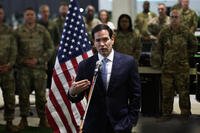Joyce Wessel Raezer, a military spouse and nationally-recognized champion of military families, retired as the executive director of the National Military Family Association in August 2019.
Since hearing the news of the U.S. drone attack that killed Iranian Maj. Gen. Qasem Soleimani, two thoughts keep running through my brain.
The first is: "Oh no, more troops wrenched from their families during the holidays heading into God knows what."
The second is the old saying: "If all you have is a hammer, everything looks like a nail."
I hate to think our nation's leaders have decided the only tool in our foreign policy toolbox these days is our military hammer, but it sure looks that way.
I'll admit I don't know what evidence there was of impending threats to the U.S., our troops and citizens overseas or our allies that led to the decision to launch that drone attack, the consequence of which is a need to increase security at home and rush more troops to the Middle East. Frankly, I'm not sure many people know the details behind the White House decision.
It may be that military action was the right one. The Iranians have been a disruptive force in the region. And we have the technology to find and destroy our enemies and the well-trained troops to back up that capability with a presence in the air, on the sea, and on the ground if necessary. After all, as some will say, what's the use of having this wonderful, expensive, well-resourced military if we're not going to use it to rid the world of the bad guys?
But just because we have a strong military, should our first response to every hothead and trouble spot be the use of force? In this current crisis, is there evidence we've used other foreign policy tools as alternatives to our military hammer? Where was the consultation and collaboration with our allies? What was the role of our intelligence services in finding and developing sympathetic friends in Iran and in the region? What about an active, respected State Department, enabled with the resources of diplomacy, humanitarian aid and professionals who understand the nuances of troubled regions and who are committed to working for better understanding and non-military solutions to international tensions?
Even former Defense Secretary and retired Marine Corps Gen. Jim Mattis understood the important role of a strong State Department, once saying: "If you don't fully fund the State Department, please buy a little more ammunition for me because I'm going to need it."
It would be wrong to deny that sometimes the military hammer must be used. Its capabilities can quiet tensions and protect the innocent. One can only hope, however, that when our military might is deployed, it is done after thoughtful deliberation and with an understanding of the consequences of using our might unilaterally: the subsequent threats to the U.S. and our allies and the fears of retaliation.
What about the consequences to the people at the tip of our spear? As thousands of troops are heading to the Middle East, joining the thousands already there, and other service members and their families make ready at home in anticipation of orders, it's important to ensure support systems frayed after 18 years of war can meet the needs of families affected by this new danger.
Yes, defense budgets have increased over the past couple of years, meaning more money for equipment, technology, training and military pay. But resources for military installations, family programs and deployment support have not grown; in some cases, this support structure has actually shrunk. Military medical positions are being downsized, putting health care access for families at risk. Military commanders are eliminating some installation-based programs. In its most recent survey of military spouses, the Defense Department found that spouses reported more deployment-related problems than two years previously.
For some military families, this latest deployment will be a new experience; for others, it's just another in a long line of separations. But for all, every deployment brings new challenges, emotions, uncertainties and the potential for childhood stress. Deployments bring opportunities for growth, but also the potential for despair. We know from the experience of the past 18 years that these are only a few of the potential consequences on the people who serve and their families when the military hammer is used. We've seen the effects of the visible and invisible wounds of war on service members, veterans and their families and know the cost of military action at home is measured in PTSD, caregiver burnout, frustration with unclear missions and anxiety, as well as in pride of service.
That's why our nation cannot rely on military might alone to solve our problems with the rest of the world. Our military members and their families are strong, patriotic, resilient and dedicated to service. We, the people who stay at home, who vote for our leaders and pay the taxes that support our nation's work abroad, owe it to those who serve the assurance that the U.S. has filled its foreign policy tool box with every resource possible and is using the right tool for the right task.
-- The opinions expressed in this op-ed are those of the author and do not necessarily reflect the views of Military.com. If you would like to submit your own commentary, please send your article to opinions@military.com for consideration.















